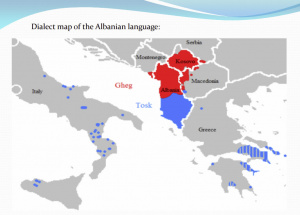Language/Tosk-albanian/Culture/History-of-Albania
| ◀️ Religious Celebrations — Previous Lesson | Next Lesson — Traditions and Customs ▶️ |
Introduction[edit | edit source]
In this lesson, we will delve into the rich history of Albania and explore the events that have shaped this fascinating country. Understanding the history of Albania is essential in gaining a deeper appreciation of the Tosk Albanian language and culture. Throughout this lesson, we will uncover historical milestones, significant figures, and key moments that have influenced the development of Albania.
Ancient History[edit | edit source]
Albania has a long and storied past that dates back to ancient times. The Illyrians, an ancient Indo-European people, were the earliest known inhabitants of the region. They established various kingdoms and tribes, leaving behind a legacy of rich cultural traditions.
One of the most prominent Illyrian tribes was the Ardiaei, who ruled over a significant portion of present-day Albania. Their queen, Teuta, famously defended their lands against the Roman Republic in the 3rd century BCE. However, the Romans eventually conquered Illyria, incorporating it into their vast empire.
Medieval Period[edit | edit source]
The medieval period in Albanian history was marked by the rise of the Byzantine Empire and the gradual spread of Christianity. The Byzantines exerted their influence over the region, establishing administrative centers and promoting Greek culture and language.
During this time, the Albanians developed a distinct identity and language that would later become known as Tosk Albanian. The arrival of the Ottoman Empire in the 14th century brought significant changes to the region, as Albania came under Ottoman rule.
Ottoman Rule[edit | edit source]
Albania spent nearly four centuries under Ottoman rule, from the late 14th century to the early 20th century. This period had a profound impact on Albanian society, language, and culture. The Ottomans introduced Islam to the region, and many Albanians converted to this new faith, while others held onto their Christian beliefs.
Despite being under Ottoman control, the Albanians maintained a strong sense of national identity and resistance to foreign rule. Figures like Gjergj Kastrioti Skanderbeg, an Albanian nobleman, led successful uprisings against the Ottomans and became a symbol of Albanian resistance.
Independence and Modern Albania[edit | edit source]
The 20th century brought significant changes to Albania, as the country fought for its independence and navigated through various political and social shifts. In 1912, Albania declared its independence from the Ottoman Empire, becoming a sovereign nation.
However, the road to stability was not easy for Albania. The country experienced periods of political unrest, occupation during World War II, and communist rule under Enver Hoxha. Hoxha's communist regime isolated Albania from the rest of the world, leading to a period of cultural and economic stagnation.
Following Hoxha's death in 1985, Albania began its transition to a democratic society. The country embraced political and economic reforms, opening up to the global community and striving for integration with Europe. Today, Albania is a member of NATO and aspires to join the European Union.
Cultural Significance[edit | edit source]
The history of Albania has had a profound impact on its culture and language. The resilience and spirit of the Albanian people are reflected in their rich folklore, traditional music, and vibrant celebrations.
One notable aspect of Albanian culture is the concept of "besa," which represents the Albanian code of honor and hospitality. Besa is a deeply ingrained cultural value that emphasizes trust, loyalty, and the fulfillment of promises. It serves as a reminder of the Albanian people's enduring spirit and unity.
Exercises[edit | edit source]
1. Match the following historical figures with their contributions to Albanian history:
* Skanderbeg * Teuta * Enver Hoxha
a) Successfully defended Albania against the Ottomans b) Led an uprising against the Roman Republic c) Imposed communist rule in Albania
Solution: * Skanderbeg - a) * Teuta - b) * Enver Hoxha - c)
2. Research and write a short paragraph about a significant event in Albanian history not mentioned in this lesson. Share your findings with the class.
Solution: [Student's response may vary]
Conclusion[edit | edit source]
The history of Albania is a fascinating journey filled with triumphs, challenges, and resilience. Understanding the historical context of Albania is crucial in comprehending the nuances of the Tosk Albanian language and culture. By exploring the events that have shaped Albania, we gain a deeper appreciation for the country and its people.
In the next lesson, we will dive into the traditions and customs that make Albanian culture unique.
Other Lessons[edit | edit source]
- Leisure Activities
- How to communicate
- History
- Albania Timeline
- Famous Albanian Writers and Poets
- Musical Traditions
- Popular Sports
- Geography of Albania
- Landmarks and Monuments
| ◀️ Religious Celebrations — Previous Lesson | Next Lesson — Traditions and Customs ▶️ |

